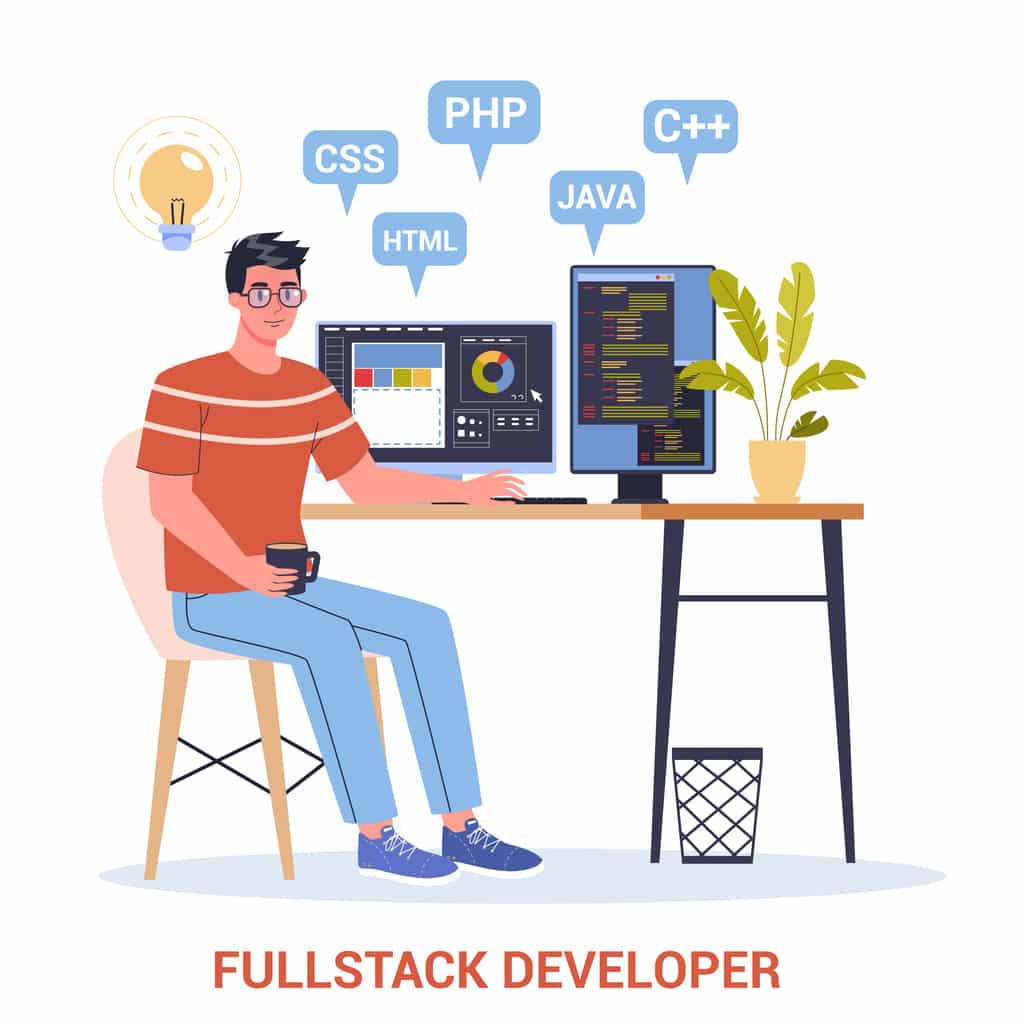In the last five years, the demand for front-end developers has surged by 25%, and according to the U.S Bureau of Labor Statistics the web development industry will rise at an 8% annual pace through 2030.
Focusing on user experience is crucial as millions of new websites and applications are built, driving demand for front-end developers.
This blog provides a comprehensive guide about what is front end development and the fundamentals of HTML, CSS, and JavaScript, as well as the skills, resources, and career opportunities to help you succeed.
What is front end development?
Front end development is a sub-branch of web development that focuses on the user interface. It focuses on the user interface, translating complex backend logic into intuitive, interactive interfaces that users can easily navigate.
The front end improves the readability and comprehension of data. The front end delivers the audience to the website and keeps them engaged.
Front end development simplifies websites for users without coding backgrounds. Without a front end, websites would display raw code, which isn’t user-friendly.
Who is a Front End Developer?
A front end developer is someone who develops and designs the user interface of a website or application. Front end development, also known as client-side development, uses HTML, CSS, and JavaScript to make data user-friendly on a website or application.
Front end development presents challenges, one of the biggest being the constant evolution of tools and techniques used to create user interfaces. Major challenge of front end developers is to ensure smooth running of websites.
Roles and Responsibilities of a Front End Developer
From the general observation of various job profiles of front end developers as imputed across organizations, there are certain core responsibilities that a front-end developer is expected to handle.
- Use HTML, CSS, and JavaScript to bring data to life.
- Ensure the website is attractive and user-friendly.
- Enhance the user experience.
- Produce the user interface: all its components, contents, and related upgrades and support.
- Innovate tools that improve user interaction and audience retention.
- Fix bugs in the application and testing for usability.
- Ensure the application works smoothly on various devices and operating systems.
Web technologies that are involved in Front End Development
Front end developers use numerous technologies to convert backend code into a user-friendly interface. Key technologies include HyperText Markup Language ( HTML ), Cascading Style Sheets (CSS), and JavaScript.
1. HTML: HTML is considered a building block of a webpage. Developers use HTML to ensure that a browser displays content accurately.
2. CSS: CSS is way more than a programming language, CSS controls the style and structure of a webpage, managing formatting, presentation, and layout. CSS dictates how content will appear on a website.
3. JavaScript: JavaScript was introduced in 1995, and before that, developers designed websites using HTML and CSS. JavaScript makes websites interactive and attractive by allowing dynamic changes to content based on user actions.
4. DOM: Document Object Model is a standard method for managing and interacting with HTML and XHTML documents across different platforms and languages.
5. CSS preprocessors: Front end developers use CSS preprocessors to add functionality to the CSS code and make it more interactive and scalable. They are organized into neatly formatted and platform-compatible CSS. Two types of CSS preprocessors are LESS and SASS.
6. Use of APIs and RESTful services: Representational State Transfer is a lightweight architecture used to ease communication over a computer network. The front end developer interacts with and utilizes the APIs ( Application Programming Interface), too.
7. Graphic Design Tools: Some preexisting knowledge of graphic design is useful prior to constructing the website prototype so that the developers can play around while not coding.
Front End Job Titles
- Front end web developer/engineer: Skilled in HTML, CSS, DOM, and JavaScript.
- CSS/HTML developer: Someone who focuses on HTML and CSS, excluding JavaScript.
- JavaScript Front end developer: When “JavaScript developer” is added to the job title, it emphasizes advanced programming and development skills using JavaScript.
- Front end web developer/designer: Skilled in programming and graphic design tools like Figma.
- UI developer/engineer: Requires front end developer skills along with design, interactive designs, and wireframing skills.
- Smartphone/tablet front end developer: This role focuses on optimizing front ends for smooth performance on smartphones and tablets.
- Front end SEO expert: SEO stands for Search Engine Optimization and focuses on crafting front end technologies toward an SEO strategy that is either given or constructed later.
- Front end accessibility expert: Someone with extensive experience in crafting front end technologies that support accessibility standards and requirements.
- Front end Quality analyst/testing engineer: Focuses on testing and managing software that involves unit testing.
- Front end Dev ops: Have expertise in software development, collaboration, integration, and automation.
Front End Developer Skills
DOM, HTML, CSS, and JavaScript come under the basic skills of front end developers. Additionally, one can have these skills:
- CMS ( Content Management System)
- Node.js
- Cross-browser testing, Cross-platform testing
- Unit testing
- Cross-device testing
- SEO ( Search Engine Optimization )
- Usability
- User Experience
- Portal system
- E-commerce system
- CSS layout
- Load testing
- Performance testing
- Mobile web performance
- GIT ( version control )
- Regular expression
- Content strategy
- Modules
- Package manager
- Code coverage testing, code complexity analysis
- Integration testing
- Command line ( CLI )
- UI widgets
- Charts and graphs
- Browser Developers Tools
- Single Page application
- Web browser security
- HTML semantics
Front End Developer Salary
Salary can vary as per the skills and experience. The average salary of a beginner front end developer in India is Rs 4,94,103 per annum.
In the USA, the average salary for a senior front end developer is $101,747 while junior front end developers earn around $70,687.
Front end development is one of the highest-paying job profiles globally. If you are dedicated to learning and growing, then you can achieve more in this industry.
As per the data of Glassdoor, the current salary for a front end developer is more than $70,000 which can rise up to $100,000 in the upcoming few years.
Company-Based Salary of a Front End Developer:
- Tata Consultancy Services Limited: Rs 590k per annum
- Accenture Technology Solutions: Rs 610k per annum
- Accenture: Rs 600k per annum
- Freshdesk: Rs 695k per annum
- Capgemini: Rs 679k per annum
- Cognizant: Rs 579k per annum
- Infosys Limited: Rs 375k per annum
Top Front End Developer Skills and Salary Insights:
Mentioned below is the average income of a front end developer based on different job profiles and skills.
- JavaScript: Rs 513,819 per annum
- CSS ( Cascading Style Sheets ): Rs 487,482 per annum
- Angular.js: Rs 512,679 per annum
- jQuery: Rs 497,485 per annum
- Bootstrap: Rs 494,781 per annum
How Experience Affects Front End Developer Salaries:
Ever wondered how having experience can impact your salary and career growth? Here are some salaries(Per Annum) for different levels of experience.
- Entry-level front end developer: Rs 305,498 PA
- Early career front end developer ( 1 to 4 years of experience ): Rs 427,532 PA
- Mid-career front end developer ( 5-9 years of experience ): Rs 806,231 PA
- Experienced front end developer ( 10+ years of experience ): Rs 1,300,000 PA
If you are an undergraduate eager to join the software industry, front end development is an excellent skill to develop, offering high-income opportunities and a promising career path.
Conclusion
The front end development is arguably among the most sought-after in the market at the moment. To succeed in this industry, the only prerequisites are creativity and knowledge of HTML, CSS, DOM, and JavaScript. Software front end developer is perfectly known as one among the highest paid positions in the global software market.You can learn front end development for free with a course provided by Great Learning to enhance your skills.
Frequently Asked Questions
Ans: Front-end development involves converting backend code into a graphical interface. It requires HTML, CSS, and JavaScript to make a website interactive and user-friendly.
Ans: Front end and backend both are equally interesting; it’s a matter of personal preference. The backend is all about developing the logic which helps to run a website or webapp smoothly whereas the front end is about creating a good user interface to enhance user experience. If you prefer creativity and have an artistic mind then the front end will be a good choice for you.
Ans: Being a front end web developer can be stressful due to deadlines, demanding clients, complex coding, and the need for creativity.
Ans: The average salary of a front end developer in India is between Rupees 4-5 lakhs.
Ans: Yes, you can use Python for both the front end and the backend.
Ans: C++ is primarily used for competitive programming and backend development. C++ has no major role in front end development.









